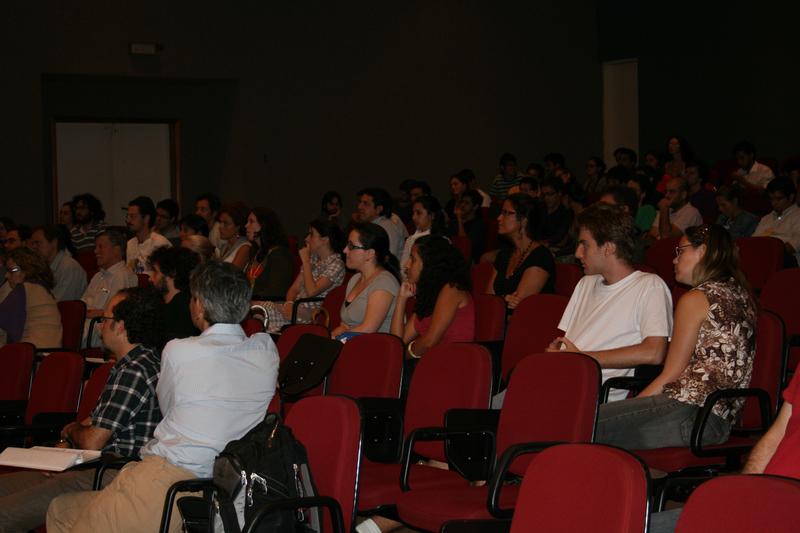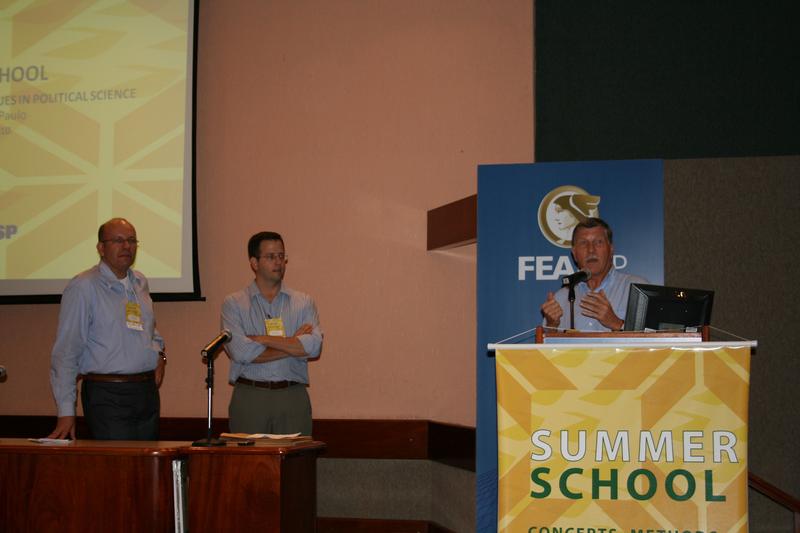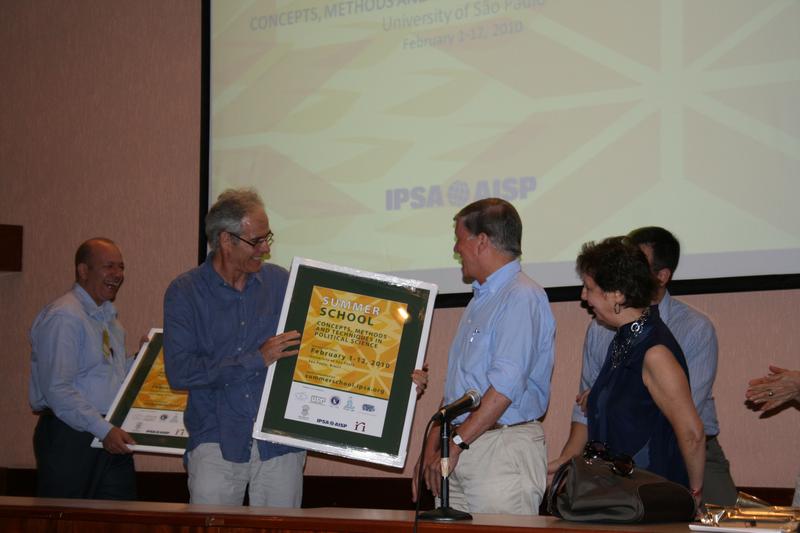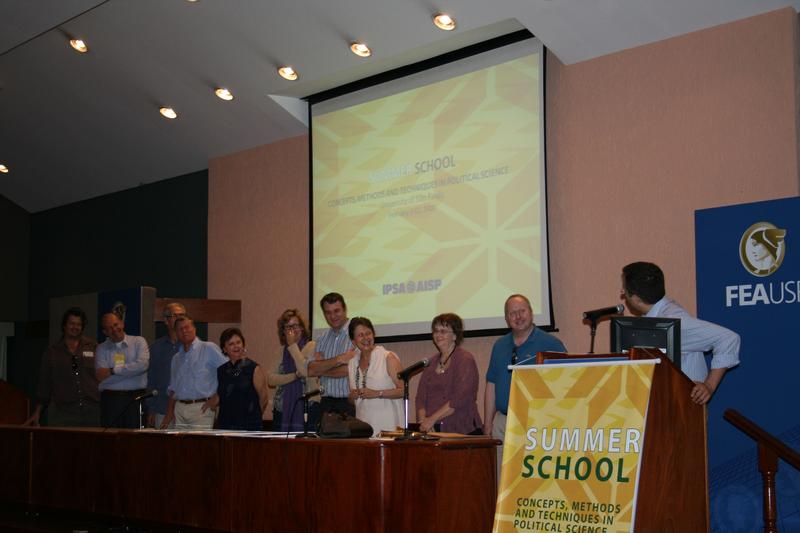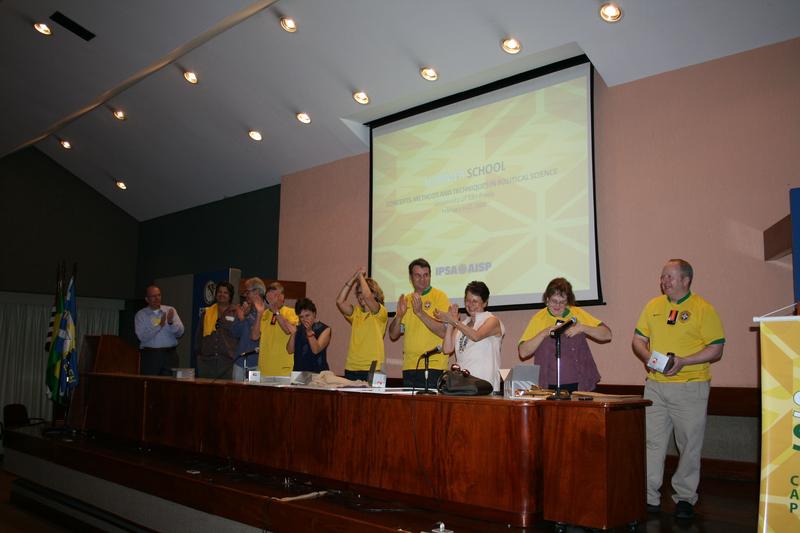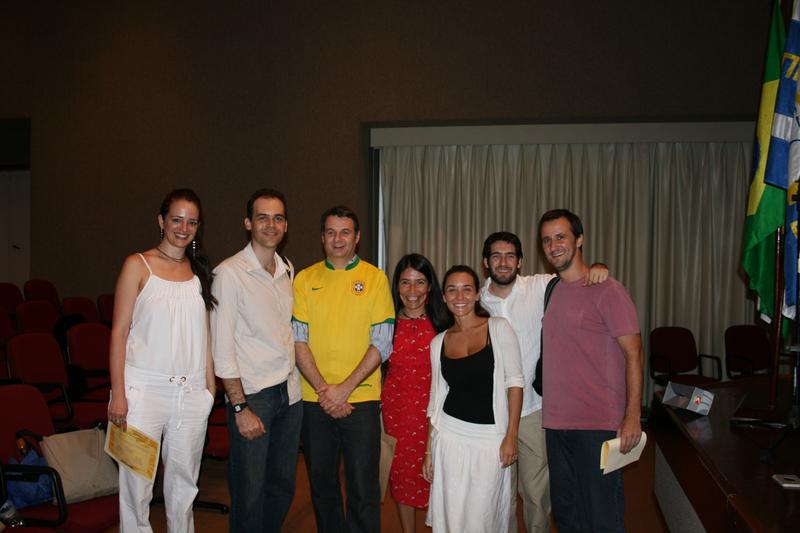
15th IPSA-USP Summer School in Concepts, Methods and Techniques in Political Science, Public Policy and International Relations
São Paulo, Brazil
13-31 January 2025
The 15th Annual IPSA-USP Summer School in Concepts, Methods and Techniques in Political Science, Public Policy and International Relations will be held in person at the University of São Paulo, Brazil, from 13-31 January 2025.
The 2025 edition offers a wide range of courses, providing students with the opportunity to enhance their skills across various areas of the field. To facilitate a structured learning experience, the 12 courses are organized into four specialized tracks::
1) Case Studies and Qualitative Analysis (CSQA);
2) Modeling and Analyzing Public Opinion (MAPO)
3) Time-Series Cross-Section Analysis (TSCS);
4) Multi-Method Research (MMR).
Although participants are free to enroll in any course, we recommend considering the track system when selecting courses. Choosing the right combination can make your learning experience even more enriching!
Classes are scheduled from 09:00 to 14:00, followed by intensive hands-on lab sessions from 14:00 to 18:00. Explore the available courses, meet our distinguished faculty, and apply online today!
Important Dates
🗓️ Application deadline: 8 November 2024
🗓️ Registration deadline: 6 December 2024
For more information about the school's courses and instructors, financial aid, registration fees, and more, visit the website or contact summerschool.dcp@usp.br.
.png)
14th IPSA-USP Summer School in Concepts, Methods and Techniques in Political Science, Public Policy and International Relations
São Paulo, Brazil
15 January-2 February 2024
The 14th Annual IPSA-USP Summer School in Concepts, Methods and Techniques in Political Science, Public Policy and International Relations was held at the University of São Paulo, Brazil, from 15 January to 2 February 2024.
In 2024, the Summer School welcomed 75 students enrolled in 152 courses. These students came from 35 institutions across 11 countries, including Europe, Asia, and the Americas. Women represented 33% of the instructors and 48% of the student participants, suggesting that at least among students there is near gender parity. 56% of students participated in at least two modules. The School’s activities were structured around three main components: morning lectures and class activities, afternoon laboratory sessions, and evening seminars led by faculty members. Faculty, post-doctoral fellows and Ph.D. students accounted for 79% of all participants in 2024.
The 2024 IPSA-USP Summer School offered a wide range of courses to students, providing them with the opportunity to enhance their skills across all areas of the field. To ensure a structured and guided learning experience, the 13 courses were organized into four tracks, ranging from Survey Research Methods and Public Policy Analysis to Multi-Method Research. The following one-week modules were offered:
Courses
Module I
- Basics of Time-Series Analysis – Natalia Moreira
- Process Tracing – Derek Beach, University of Aarhus
- Quantitative Analysis for Public Policy – Bruno Cautrés, Sciences Po
- Multi-Methods: Integrating Case Studies and Regression – Jason Seawright, Northwestern University
Module II
- Fundamentals of Time Series Cross-Section Analyses - Lorena Barberia, University of São Paulo and Natalia Moreira
- Learning About How Things Work: Evaluating Policy Using Case Studies - Derek Beach, University of Aarhus
- Survey Methods for Social Sciences – Bruno Cautrés, Sciences Po
- Advanced Issues in Multi-Methods Research: Integrating Case Studies and Contemporary Methods for Causal Inference – Jason Seawright, Northwestern University
- Experimental Political Science - Soledad Artiz Prillaman, Stanford University
Module III
- Advances of Time-Series Cross-Section Analysis – Guy Whitten, Texas A&M
- Interpreting and Critiquing Causal Inference - Jonathan Phillips, Leiden University
- Survey Research Analysis - Soledad Artiz Prillaman, Stanford University
- Fundamentals of Regression Analysis – Manoel Galdino, University of São Paulo
For more information about the school's courses and instructors, financial aid, registration fees, and more, visit the website or contact summerschool.dcp@usp.br.
.png)
12th Annual IPSA-USP Summer School in Concepts, Methods and Techniques in Political Science, Public Policy and International Relations
Online
22-26 February 2021
The 12th Annual IPSA-USP Summer School in Concepts, Methods, and Techniques in Political Science, Public Policy, and International Relations was held virtually for the first time on 22-26 February 2021.
In light of the pandemic constraints and the challenges of teaching and learning for prolonged periods online, the Virtual IPSA-USP Summer School adjusted its focus to provide mentorship and targeted feedback to research projects submitted by students.
The 2021 edition offered five distinct workshops on the following topics:
1. Comparative Historical Methods: Matthew Lange (McGill University, Canada) and Derek Beach (Aarhus University, Denmark)
2. Comparative Research Design: Allyson Benton (City University, London, UK) and Glauco Peres da Silva (University of São Paulo, Brazil)
3. Causal Inference and Experiments: Florian Foos (London School of Economics, UK), Mark Pickup (Simon Fraser University, Canada) and Jonathan Phillips (University of São Paulo, Brazil)
4. Surveys and Public Opinion: Bruno Cautrès (Sciences Po, France) and Laron Williams (University Missouri, USA)
5. Time-Series and Panel Data: Guy Whitten (Texas A&M University, USA), Andrew Philips (University of Colorado, Boulder, USA), and Lorena Barberia (University of São Paulo, Brazil).
Each workshop was held on a single day. They were split between a two-hour morning workshop, led by faculty summarizing an applied overview of the research topic, key concepts, and methodologies, and a 1.5-hour afternoon session in which faculty provided feedback on the participants’ previously submitted papers.
From over 200 applications worldwide, 76 applicants were selected to participate. They were invited to submit papers, of which 58 did so and participated in the final school. Each workshop had an average of 12 students, along with intensive interactions and discussions with faculty.
Additionally, the Summer School organized three roundtable webinars to discuss key issues related to methodology in the ongoing pandemic. Over 500 participants registered for the seminars, which stimulated lively and productive debates.
1. The Challenges of Teaching and Learning Methods in the Virtual Classroom during the COVID-19 Pandemic (Tuesday, 23 February)
- Chair: Glauco Peres da Silva, Universidade de São Paulo
- Soledad Artiz Prillaman, Stanford University
- Dr. Cameron Wimpy, Arkansas State University
- Allyson Benton, City, University of London
- Jonathan Phillips, Universidade de São Paulo
2. The Methodological Challenges of the Dynamics of the Pandemic in Brazil: A Dialogue across the Disciplines (Wednesday, 24 February)
- Chair: Lorena Barberia, Department of Political Science, Universidade de São Paulo (USP)
- Natalia S. Bueno, Department of Political Science, Emory University
- Márcia Castro, Department of Global Health and Population, Harvard School of Public Health
- Roberto Kraenkel, Institute of Theoretical Physics, Universidade Estadual Paulista (UNESP)
- Pedro Peixoto, Department of Mathematics and Statistics, Universidade de São Paulo (USP)
3. Methodological Challenges of Research on the COVID-19 Pandemic (Thursday, 25 February)
- Chair: Guy D. Whitten, Department of Political Science, Texas A&M University
- Lonna Atkeson, Department of Political Science, University of New Mexico
- Jeff Gill, Department of Government and Department of Mathematics & Statistics, American University
- Alison Post, Department of Political Science, UC Berkeley
- Jason Seawright, Department of Political Science, Northwestern University
.png)
11th Annual IPSA-USP Summer School in Concepts, Methods and Techniques in Political Science, Public Policy and International Relations
University of São Paulo, Brazil
January 6-31, 2020
The 11th Annual IPSA-USP Summer School in Concepts, Methods, and Techniques in Political Science, Public Policy, and International Relations will be held at the University of São Paulo, Brazil, from January 6 to 31, 2020.
The Summer School is organized as an intensive four-week program. The first week consists of a core foundational block to ensure participants gain fundamental skills that are essential to methodological training. The next three sessions consist of one-week courses organized along methodological tracks. The core foundational block will take place from January 6 to 10, 2020.
Week 1 of the methodological track will take place from January 13 to 17, 2020. Week 2 will take place from January 20 to 24, 2020, and Week 3 will take place from January 27 to 31, 2020. Each one-week session will consist of 35 hours of rigorous training. For most courses, morning sessions will consist of lectures and afternoons will focus on lab applications. The Summer School will also offer late-afternoon seminars, information sessions, and a poster session.
.
Core Foundational Blocks (January 6-10, 2020)
Mathematics for Social Scientists (Glauco Peres da Silva, Jonathan Phillips and Lorena Barberia, University of São Paulo)
Core Methodological Tracks
- Track on Comparative Research with Interviews and Ethnography
Week 1. Designing Comparative Research (Allyson Benton - City, University of London)
Week 2. Interviewing and Multi-Methods Research (Melanie Cammett - Harvard University)
Week 3. Ethnographic Fieldwork in Political Science (Edward Schatz - University of Toronto)
- Track on Comparative Historical Analyses
Week 1. Comparative Historical Analysis (Matthew Lange, McGill University)
Week 2. Process-Tracing (Derek Beach, Aarhus University)
Week 3. Using Process-Tracing (Derek Beach, Aarhus University)
- Track on Modeling and Analyzing Public Opinion
Week 1. Survey Design (Bruno Cautrès, Sciences Po)
Week 2. Survey Analysis (Bruno Cautrès, Sciences Po)
Week 3. Comparative Survey Analyses (Laron Williams, University of Missouri)
- From Regression to Multi-Method Research Track
Week 1. Essentials of Regression Analysis (Glauco Peres da Silva, University of São Paulo)
Week 2. Multi-Method Research: Regression and Case Studies (Jason Seawright, Northwestern University)
Week 3. Multi-Method Research: Extensions (Jason Seawright, Northwestern University)
- Track on Time Series Cross-Sectional Data Analysis
Week 1. Essentials of Time Series Analysis for Time Series Cross-Section Analyses (Lorena Barberia, University of São Paulo and Guy Whitten, Texas A&M University)
Week 2. Fundamentals of Time Series Cross-Section Analyses (Lorena Barberia, University of São Paulo and Guy Whitten Texas A&M University)
Week 3. Advanced Time Series Cross-Section Analyses (Lorena Barberia, University of São Paulo and Andrew Q, Philips, University of Colorado)
- Track on Causal Inference and Experiments
Week 1. Causal Inference and Field Experiments (Florian Foos, London School of Economics and Political Science)
Week 2. Survey Experiments (Mark Pickup, Simon Fraser University)
Week 3. Making Causal Critiques (Jonathan Phillips, University of São Paulo)
- Methods in Normative Political Theory and Political Philosophy
Week 1. Methods and Problems in Political Philosophy (Herlinde Pauer-Struder, University of Vienna)
Applications are due October 1, 2019.
For further details on the School’s courses and instructors, financial aid, registration fees, and more, visit the website (http://summerschool.fflch.usp.br) or contact summeripsa@usp.br
Be sure to “Like” the Facebook page: www.facebook.com/ipsamethodssummerschoolbrazil
Local Organization Committee
Lorena Barberia, Department of Political Science, University of São Paulo (Chair)
Jonathan Phillips, Department of Political Science, University of São Paulo
Glauco Peres da Silva, Department of Political Science, University of São Paulo
Key Dates:
- Applications are due by October, 2019.
- Notifications of acceptances will be sent by the end of October, 2019.
- Applicants must pay the registration fee by November, 2019.
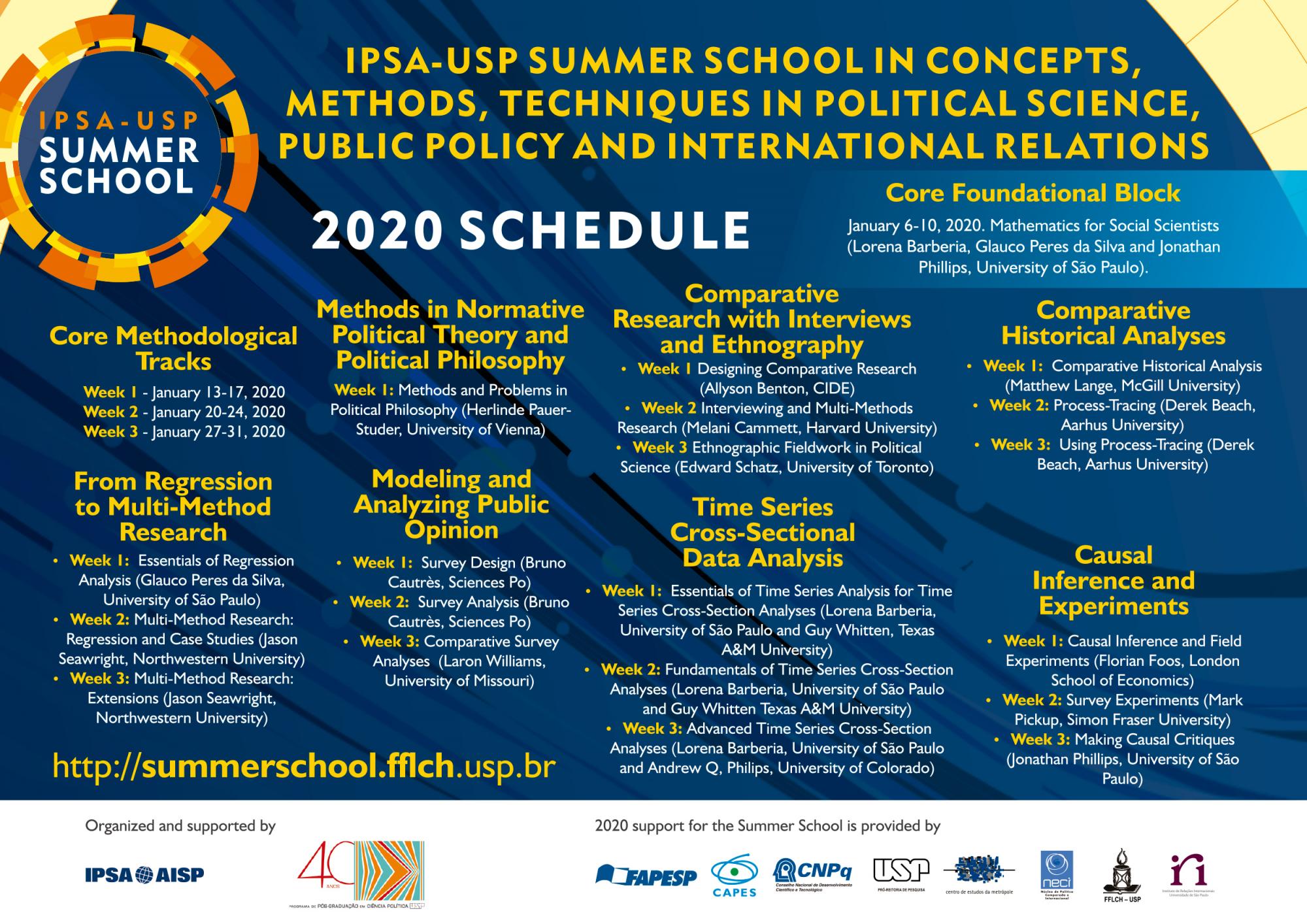

10th Annual IPSA-USP Summer School in Concepts, Methods and Techniques in Political Science, Public Policy and International Relations
University of São Paulo, Brazil
January 14-February 1, 2019
The 10th Annual IPSA-USP Summer School in Concepts, Methods and Techniques in Political Science, Public Policy and International Relations was held at the University of São Paulo, Brazil, from January 14 to February 1, 2019.
Some 173 participants from 23 countries attended, with women accounting for 50.8% of enrollment. 328 student-modules were completed in 23 one-week courses.
The following courses were offered:
Module 1 (January 14-18) (35 hours)
- Basics of Quantitative Methods for Public Policy Analysis, Bruno Cautres (Sciences Po)
- Designing Feasible Research Projects in Political Science, Allyson Benton (Centro de Investigación y Docencia Económicas, Mexico City)
- Essentials of Applied Data Analysis and Multiple Regression Analysis, Glauco Peres da Silva (University of São Paulo)
- Essentials of Time Series for Time Series Cross Section Analyses, Lorena Barberia (University of São Paulo) and Guy D. Whitten, Texas A&M University
- Interviewing and Multi-Methods Research, Melani Cammett (Harvard University)
- Introduction to Spatial Analysis, Jonathan Phillips (University of São Paulo)
- Predicting Elections, Cliff Young (IPSOS)
- Survey Research Design, Soledad Artiz Prillaman (Nuffield College at Oxford University)
Module 2 (January 21 -25) (35 hours)
- The Philosophy of Science: Positivism and Beyond, Patrick Thaddeus Jackson (American University)
- Advanced Issues in Quantitative Methods for Public Policy Analysis, Bruno Cautres (Sciences Po)
- Advanced Research Design in Political Science: From Modeling to Manuscript, Allyson Benton (Centro de Investigación y Docencia Económicas, Mexico City)
- Basics of Causal Case Study Methods, Derek Beach (University of Aarhus)
- Basics of Multi-Method Research: Integrating Case Studies and Regression, Jason Seawright (Northwestern University)
- Basics of Spatial Interdependence in Theory and Practice, Laron Williams (University of Missouri)
- Fundamentals of Time Series Cross Section Analyses, Guy D. Whitten (Texas A&M University) and Lorena Barberia (University of São Paulo)
- Mathematics for Social Scientists, Glauco Peres da Silva (University of São Paulo)
- Survey Research Analysis, Soledad Artiz Prillaman (Nuffield College at Oxford University)
Module 3 (January 28 –February 1st) (35 hours)
- Advanced Issues in Multi-Methods Research: Integrating Case Studies and Contemporary Methods for Causal Inference, Jason Seawright (Northwestern University)
- Advanced Time Series Cross-Section Analyses, Andy Phillips (University of Colorado at Boulder) and Lorena Barberia (University of São Paulo)
- An Introduction to Survey Experiments, Mark Pickup (Simon Fraser University)
- Building Parametric Statistical Models, Glauco Peres da Silva (University of São Paulo)
- Making Causal Critiques, Jonathan Phillips (University of São Paulo)
- Methods and Problems in Political Philosophy, Herlinde Pauer-Studer (University of Vienna)
- Process Tracing Case Studies, Derek Beach (University of Aarhus)
Several events were organized to celebrate the School’s 10th Anniversary. Gary King, Albert J. Weatherhead III University Professor at Harvard University, and Director of the Institute for Quantitative Social Science, delivered his keynote address “How the News Media Activate Public Expression and Influence National Agendas” on Wednesday, January 16. A special 10th Anniversary Roundtable titled “What will Political Science look like in Ten Years’ Time?” was held with the participation of Gary King, Dirk Berg-Schlosser (Marburg and IPSA), Guy Whitten (Texas A & M) and Lorena G. Barberia (São Paulo) on Thursday, January 17th. During week two, John B. Londregan, Professor of Politics and International Affairs at Princeton University, delivered the 10th Anniversary Distinguished Lecture on “Regime Type and the Extensive and Intensive Margins of Trade.” In week three, Mark Pickup (Simon Fraser) delivered the 10th Anniversary Distinguished Late-Afternoon Seminar on "Balance as a Pre-Estimation Test for Longitudinal Analysis." Laron Williams (Missouri) and Soledad Artiz Prillaman (Nuffield College at Oxford) also participated in an information session on “Applying to Graduate and Post-Doctoral Programs in the U.S. and Europe.”
A poster session including 26 presenters took place on Tuesday, January 29, 2019. Three prizes were awared by a faculty committee chaired by Allyson Benton from the Centro de Investigación y Docencia Económicas (CIDE), Andrew Philips (Colorado at Boulder), and Jason Seawright (Northwestern). The IPSA-USP Summer School and Society for Political Methodology (Polmeth) Prize in Methodology was awarded to Natalia de Paula Moreira (São Paulo) for her poster on “Bias and Efficiency Gains in Compositional Dependent Variables in Static and Dynamic Scenarios.” The IPSA-USP Summer School and International Political Science Association (IPSA) Prize in Applied Methodology was awarded to Leonardo da Rocha Loures Bueno from the Fundação Getúlio Vargas for his poster on “Retrospective Voting in Brazil: Short and Long-term Effects of São Paulo's Smart Card Policy.” The IPSA-USP Summer School and International Political Science Association (IPSA) Prize in Applied Methodology (honorable mention) was awarded to Thiago de Oliveira Meireles (São Paulo) for his poster titled “Do Political Parties Matter for Subnational International Activities? Evidence from Brazilian municipalities.”
Institutional Partners
The 2019 IPSA-USP Summer School was made possible with generous financial support from the Department of Political Science, the Institute of International Relations, the School of Philosophy, Letters and Humanities (FFLCH) and the Provost’s Office for Research at the University of São Paulo. We are grateful for the valuable support provided by FAPESP, CAPES and CNPq and IPSOS. The Summer School was also supported by the Center for Metropolitan Studies (CEM) and the Center for Comparative and International Studies (NECI) at the University of São Paulo. Stata and Nvivo provided software licensing for the computer laboratories.
Local Organization Committee
- Lorena Barberia, Department of Political Science, University of São Paulo (Chair)
- Jonathan Phillips, Department of Political Science, University of São Paulo
- Glauco Peres da Silva, Department of Political Science, University of São Paulo
For further details on the School’s courses and instructors, financial aid, registration fees, and more, visit the website http://summerschool.fflch.usp.br or contact summeripsa@usp.br
Like the Facebook page: www.facebook.com/ipsamethodssummerschoolbrazil
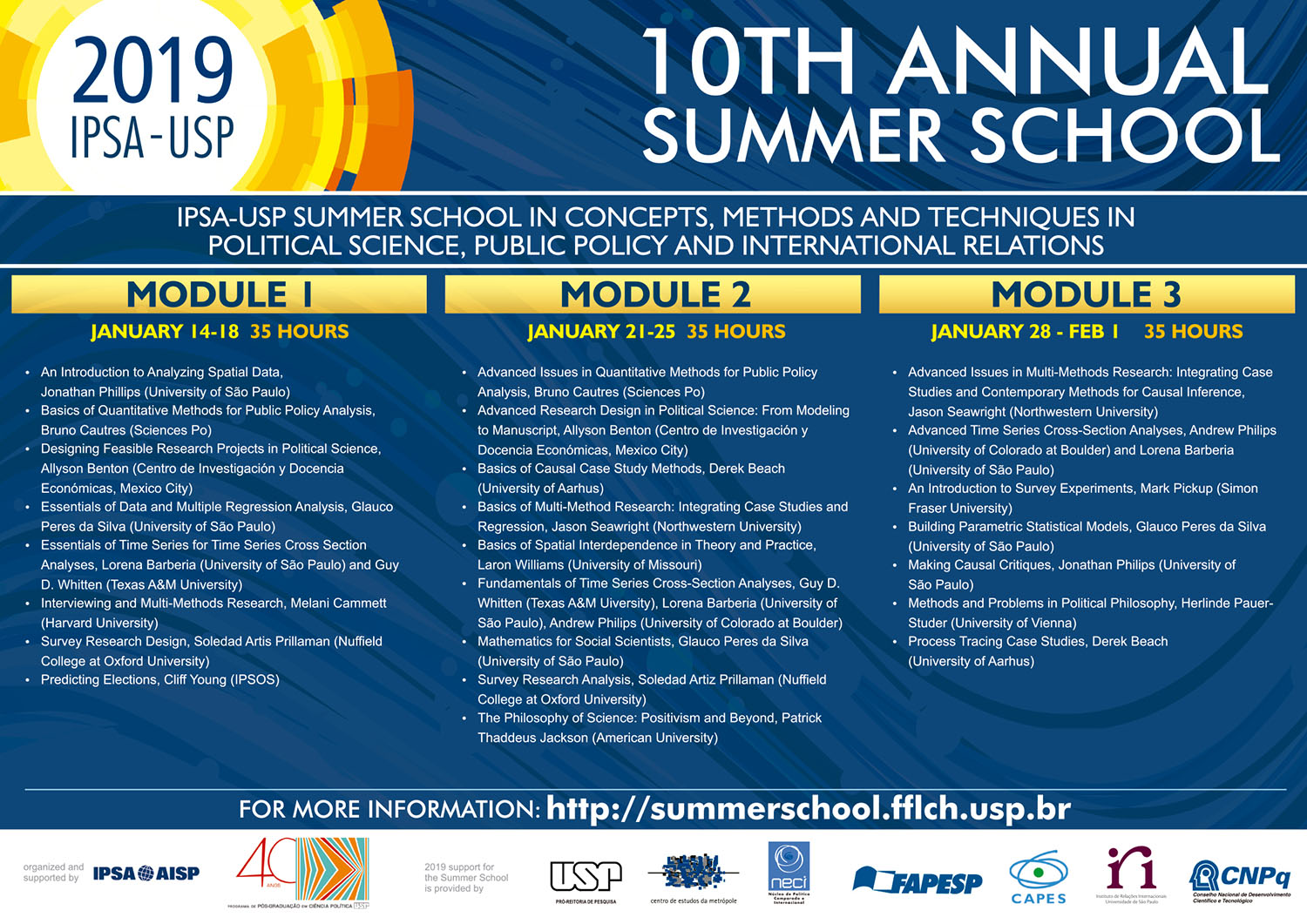

9th Annual IPSA-USP Summer School in Concepts, Methods and Techniques in Political Science and International Relations
January 8-26, 2018
University of São Paulo
The 9th Annual IPSA-USP Summer School in Concepts, Methods and Techniques in Political Science and International Relations was held at the University of São Paulo, Brazil from January 8 to 26, 2018. Jointly organized by the University of São Paulo’s Department of Political Science and Institute of International Relations and the International Political Science Association (IPSA), the Summer School is recognized as a leading program providing basic and advanced training in a range of methodologies and techniques. In 2018, the School was awarded a prestigious grant by FAPESP as a São Paulo School of Advanced Science (ESPCA). Some 162 participants from 23 countries attended, with women accounting for 49% of enrollment. A total of 312 student-modules were completed in 20 one-week courses.
The following one-week modules were offered:
*Module 1 (January 8-12) (35 hours) *
- Basics of Quantitative Methods for Public Policy Analysis, Bruno Cautres (Sciences Po)
- Designing Feasible Research Projects in Political Science, Allyson Benton (CIDE)
- Essentials of Applied Data Analysis, Leonardo Barone (University of São Paulo)
- Essentials of Multiple Regression Analysis, Glauco Peres da Silva (University of São Paulo)
- Modeling Dynamics, Lorena Barberia (University of São Paulo), Andy Phillips (University of Colorado at Boulder)
*Module 2 (January 15 -19) (35 hours) *
- Advanced Issues in Quantitative Methods for Public Policy Analysis, Bruno Cautres (Sciences Po)
- Advances in Modeling Dynamics, Guy D. Whitten (Texas A&M University), Lorena Barberia (University of São Paulo), Andy Phillips (University of Colorado at Boulder)
- Basics of Causal Case Study Methods, Derek Beach (University of Aarhus)
- Basics of Multi-Method Research: Integrating Case Studies and Regression, Jason Seawright (Northwestern University)
- Basics of Spatial Interdependence in Theory and Practice, Laron Williams (University of Missouri)
- Building Parametric Statistical Models, Glauco Peres da Silva (University of São Paulo)
- Survey Research Design, Soledad Artiz Prillaman (Nuffield College at Oxford University)
*Module 3 (January 22 -26) (35 hours) *
- Advanced Issues in Multi-Method Research: Integrating Case Studies and Contemporary Methods for Causal Inference, Jason Seawright (Northwestern University)
- An Introduction to Relational Social Science, Patrick Thaddeus Jackson (American University)
- Conducting Field Research in Political Science: Interviewing and Mixed Methods Approaches, Melani Cammett (Harvard University)
- Mathematics for Social Scientists, Glauco Peres da Silva (University of Sao Paulo)
- Methods and Problems in Political Philosophy, Herlinde Pauer-Studer (University of Vienna)
- Modeling Dynamics in Space and Time, Guy D. Whitten (Texas A&M University) and Lorena Barberia (University of São Paulo)
- Process Tracing Case Studies, Derek Beach (University of Aarhus)
- Survey Research Analysis, Soledad Artiz Prillaman (Nuffield College at Oxford University)
Students also participated in the following four information sessions: research funding opportunities in Brazil; publishing academic research for maximum impact on shaping public policy; achieving success in graduate school; and SAGE Research Methods – Online Resources. As part of site visits, students also had a chance to learn about the work carried out at the Center for Metropolitan Studies (CEM) and the Center for the Study of Violence at the University of São Paulo (NEV-USP). On Saturday, January 20, a special workshop was held on “Coalitions in Presidential Regimes and Clarity of Responsibility in Latin America.” The workshop was organized by Lorena G. Barberia and Guy D. Whitten, and included the participation of several researchers from the IPSA-USP Summer School who presented their research on country-specific case studies in Latin America.
Three late-afternoon seminars were also held. During the first week, a seminar was held to discuss social media and methods. Allyson Benton (CIDE) and Andrew Q. Philips (University of Colorado Boulder) presented their paper entitled “Do Trump's Policy Tweets Matter to Mexican Financial Markets?” Rafael Martins de Souza (FGV-CERI), Luís Felipe Guedes da Graça (Universidade Federal de Santa Catarina) and Ralph dos Santos Silva (Universidade Federal do Rio de Janeiro) presented their recently published article on “Politics on the Web: Using Twitter to Estimate the Ideological Positions of Brazilian Representatives.” Jonathan Phillips, currently a visiting researcher at CEPESP, Fundação Getulio Vargas and the Department of Political Science, University of São Paulo, served as the discussant. In the second week, Guy D. Whitten presented a seminar entitled “The Dynamic Pie Project: Theory↔Methods with Dynamic Compositional Data.” In the third week, a panel discussion on gender and methods was held with the participation of Derek Beach (University of Aarhus), Allyson Benton (CIDE), Melani Cammett (Harvard University), and Jason Seawright (Northwestern University).
At the Summer School poster session held Thursday, January 20, 2018, participants presented 65 posters. The winners of the 2018 Poster Competition were Hannah Paul (Department of Political Science, University of Colorado Boulder); Lucas Mingardi (Department of Political Science, USP) for Comparative Politics (tie); Pedro de Castro, (Department of Political Science, USP) for Political Theory; and Eliana Alvarez, Rosario Queirolo, and Lorena Repetto (Department of Political Science, Universidad Católica del Uruguay) for Best Research Design.
Institutional Partners
The 2018 IPSA-USP Summer School was made possible with generous financial support from the Department of Political Science, the Institute of International Relations, and the Provost’s Office for Research at the University of São Paulo. We are grateful for the valuable support provided by FAPESP and CNPq. The Summer School was also supported by the Center for Metropolitan Studies (CEM) and the Center for Comparative and International Studies (NECI) at the University of São Paulo. Stata and Nvivo provided software licensing for the computer laboratories.
Local Organization Committee
Lorena Barberia, Department of Political Science, University of São Paulo (Chair)
Daniela Schettini, Institute for International Relations, University of São Paulo
Glauco Peres da Silva, Department of Political Science, University of São Paulo
For more information on the School visit our website (http://summerschool.fflch.usp.br) or contact us at summeripsa@usp.br.
Like us on Facebook: www.facebook.com/ipsamethodssummerschoolbrazil
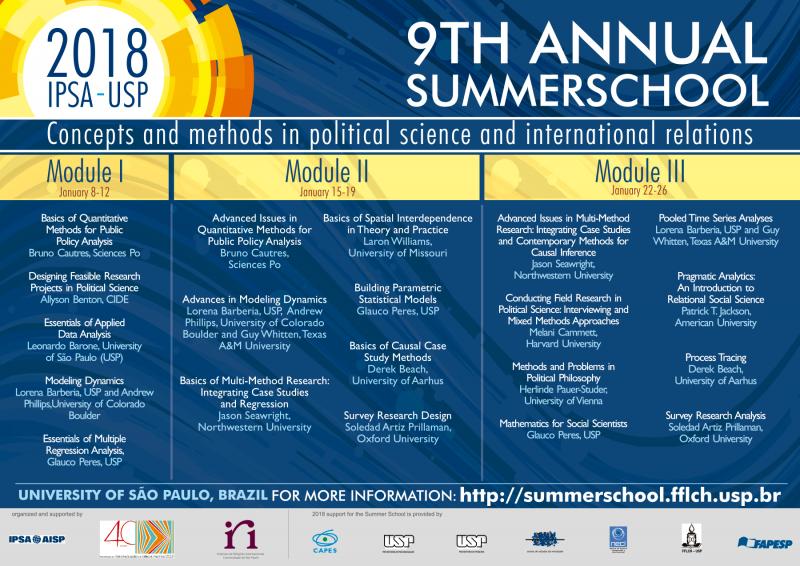
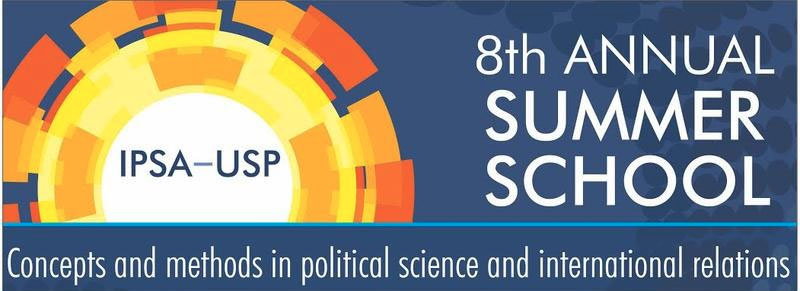
8th Annual IPSA-USP Summer School in Concepts, Methods and Techniques in Political Science and International Relations
January 23-February 10, 2017
University of São Paulo
The 8th session of the IPSA-USP Summer School was held at the University of São Paulo from January 23 to February 10, 2017. Jointly organized by the University of São Paulo’s Department of Political Science and Institute of International Relations and the International Political Science Association (IPSA), the Summer School is recognized as a leading program providing basic and advanced training in a range of methodologies and techniques. In 2017, a record 169 students (from 51 institutions in 18 countries, with women accounting for 40% of the student body) enrolled in 19 one-week courses given by the Summer School.
The following one-week modules were offered:
- Basics of Causal Case Study Methods – Derek Beach, University of Aarhus
- Building Parametric Statistical Models – Glauco Peres da Silva, University of São Paulo
- Designing Feasible Research Projects in Political Science – Allyson L. Benton – CIDE
- Essentials of Applied Data Analysis – Leonardo Barone, University of São Paulo
- Methods and Problems in Political Philosophy – Herlinde Pauer-Studer, University of Vienna
- Modeling Dynamics – Lorena Barberia, University of São Paulo and Andrew Phillips, Texas A&M
- Advances in Modeling Dynamics – Lorena Barberia, University of São Paulo and Guy Whitten and Andrew Phillips, Texas A&M
- Basics of Multi-Method Research: Integrating Case Studies and Regression – Jason Seawright, Northwestern University
- Basics of Quantitative Methods for Public Policy Analysis – Bruno Cautrès, Science Po
- Basics of Set-Theoretic Methods and Qualitative Comparative Analysis (QCA) – Carsten Schneider, Central European University
- Basics of Spatial Interdependence in Theory and Practice – Laron Williams, University of Missouri
- The Philosophy of Science: Positivism and Beyond – Patrick T. Jackson, American University
- Using Case-Based Methods in Practice – Derek Beach, University of Aarhus
- Advanced Issues in Multi-Method Research: Integrating Case Studies and Contemporary Methods for Causal Inference – Jason Seawright, Northwestern University
- Advanced Issues in Set-Theoretic Methods and Qualitative Comparative Analysis (QCA) – Carsten Schneider, Central European University
- Advanced Issues in Quantitative Methods for Public Policy Analysis – Bruno Cautrès, Science Po
- Essentials of Multiple Regression Analysis – Glauco Peres da Silva, University of São Paulo
- Modeling Dynamics in Space and Time – Guy Whitten, Texas A & M University and Lorena Barberia, University of São Paulo
- Predicting Elections – Clifford Young, IPSOS-Washington
Students also participated in three information sessions on studying in Europe and the U.S., replication in qualitative research, and recent controversies regarding p-values. A late-afternoon seminar on “Why do voters disagree about the strength of the national economy? A hybrid model of spatial evaluations” was delivered by Laron Williams. Clifford Young, Jason Seawright, and Guy Whitten participated in a panel discussion on “Explaining the U.S. Election.” The top prize in the 2017 poster competition was presented to Marina Merlo for her poster “Women, Political Parties and Elections: A Long Way to Run?”
Institutional Partners
The 2017 IPSA-USP Summer School was made possible with the generous financial support of the Department of Political Science, the Institute of International Relations, the School of Philosophy, Letters and the Humanities (FFLCH), and the Provost’s Office for Research at the University of São Paulo. We are also grateful for the valuable support provided by FAPESP, CAPES, and CNPq. Together, these public sector research funding institutions have been long-time supporters of the Summer School and invaluable to its success. The Summer School is also supported by the Center for Metropolitan Studies (CEM) and the Center for Comparative and International Studies (NECI) at the University of São Paulo. Scholarships for participants of the School from developing countries were provided by IPSA and Ipsos. Stata provided software licensing for the computer laboratories.
Local Organization Committee
Lorena Barberia, Department of Political Science, University of São Paulo (Chair)
Daniela Schettini, Institute for International Relations, University of São Paulo
Glauco Peres da Silva, Department of Political Science, University of São Paulo
Adriana Schor, Institute for International Relations, University of São Paulo
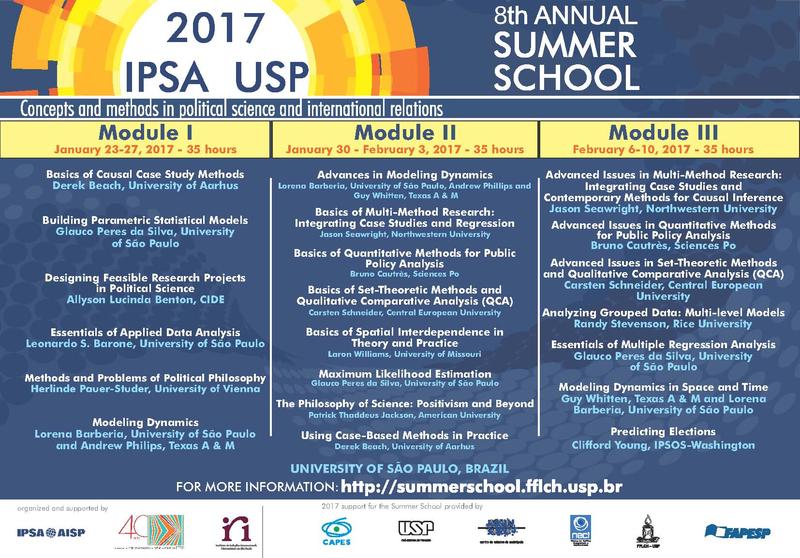

7th Annual IPSA-USP Summer School in Concepts, Methods and Techniques in Political Science and International Relations
January 18-February 5, 2016
University of São Paulo
The 7th session of the IPSA-USP Summer School was held at the University of São Paulo from January 18 to February 5, 2016. Organized by the University of São Paulo’s Department of Political Science and Institute of International Relations and the International Political Science Association (IPSA), the Summer School is recognized as a leading program providing basic and advanced training in a wide range of methodologies and techniques. In 2016, the School welcomed 225 students enrolled in 14 courses from 44 institutions in 17 countries, with women accounting for 52% of the student body.
The following one-week modules were offered:
- The Philosophy of Science: Positivism and Beyond - Patrick T. Jackson, American University
- Essentials of Applied Data Analysis, Leonardo Barone, University of São Paulo
- Essentials of Multiple Regression Analysis – Glauco Peres da Silva, University of São Paulo
- Essentials of Time Series Analysis- Lorena Barberia, University of São Paulo
- Advanced Time Series Analysis - Lorena Barberia, University of São Paulo and Guy Whitten, Texas A & M University
- Basics of Causal Case Study Methods- Derek Beach, University of Aarhus
- Basics of Multi-Method Research: Integrating Case Studies and Regression, Jason Seawright, Northwestern University
- Basics of Quantitative Methods for Public Policy Analysis – Bruno Cautrès, Science Po
- Building Parametric Statistical Models - Randy Stevenson, Rice University
- Advanced Issues in Multi-Method Research: Integrating Case Studies and Contemporary Methods for Causal Inference, Jason Seawright, Northwestern University
- Advanced Issues in Quantitative Methods for Public Policy Analysis – Bruno Cautrès, Science Po
- Maximum Likelihood Estimation - Randy Stevenson, Rice University
- Pooled Time Series Analyses - Guy Whitten, Texas A & M University
- Using Case-Based Methods in Practice- Derek Beach, University of Aarhus
Students also participated in two Information Sessions on academic publishing and replication. A late-afternoon seminar on “Studying the Political Behavior of American Billionaires: A Multi-Method Approach” was delivered by Jason Seawright. A panel discussion on “Corruption, the PT and Lava Jato: Long term implications and Public Opinion” was held with participation by José Roberto de Toledo Rosário, Sérgio Praça, Alberto Almeida, Guy Whitten and Clifford Young. For the first time, the School also hosted a meet the author session with Guy Whitten to celebrate the Portuguese book launch of the Fundamentals of Doing Political Science Research (co-authored with Paul Kellstedt). The first prize of the 2016 poster competition was awarded to Rodrigo Martins for his poster "PSDB in its Origin: An analysis of the Constituent Assembly Period."
Institutional Partners
The 2016 IPSA-USP Summer School was made possible with the generous financial support of the Department of Political Science, the Institute of International Relations, the School of Philosophy, Letters and the Humanities (FFLCH), and the Provost’s Office for Research at the University of São Paulo. We are also grateful for the valuable support provided by BNDES, FAPESP, CAPES and CNPq. Together, these public sector research funding institutions have been long-time supporters of the Summer School and invaluable to its success. The Summer School is also supported by the Center for Metropolitan Studies (CEM) and the Center for Comparative and International Studies (NECI) at the University of São Paulo.
Local Organization Committee
Lorena Barberia, Department of Political Science, University of São Paulo (Chair)
Daniela Schettini, Institute for International Relations, University of São Paulo
Glauco Peres da Silva, Department of Political Science, University of São Paulo
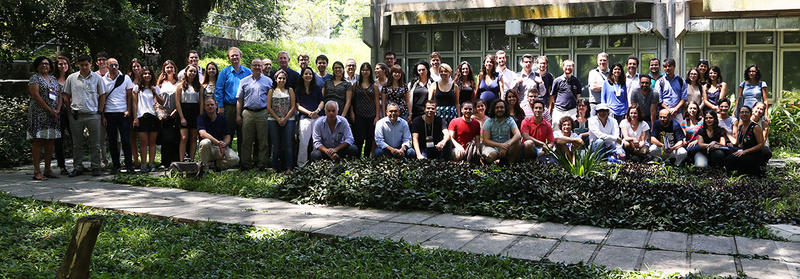
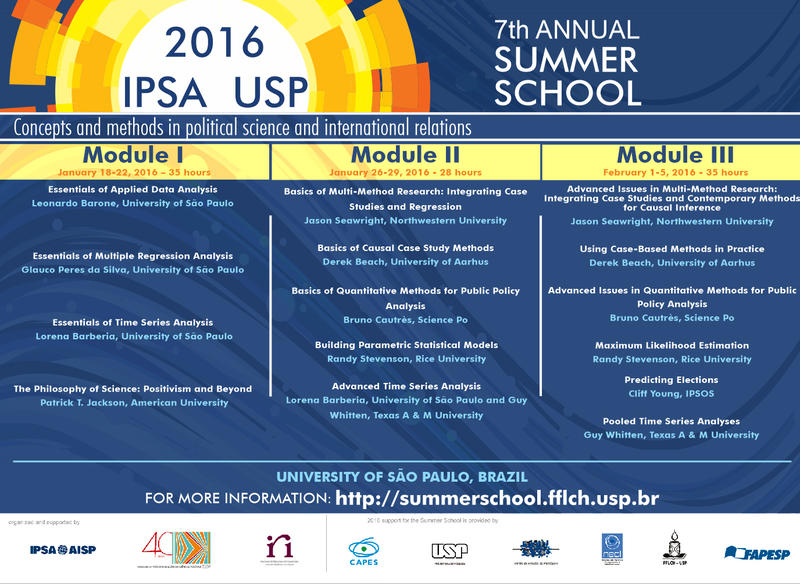

6th IPSA-USP Summer School on Methods and Concepts in Political Science and International Relations
January 26 - February 13, 2014
University of São Paulo, Brazil
The 6th session of the IPSA-USP Summer School on Methods and Concepts in Political Science and International Relations was held at the University of São Paulo from January 26 to February 13, 2015. A cooperative partnership between the International Political Science Association (IPSA) and the University of São Paulo’s Department of Political Science and Institute of International Relations, the School welcomed 204 students enrolled in 13 courses from 62 institutions in 17 countries, with women accounting for 50% of the student body.
The following courses quantitative and qualitative courses were offered:
- Refresher Course in Statistics (Leonardo Barone, Getúlio Vargas Foundation)
- Refresher Course in Mathematics (Glauco Peres da Silva, University of São Paulo)
- Refresher Course in Multiple Regression Analysis (Lorena Barberia, University of São Paulo)
- Knowing and the Known: An Introduction To The Philosophy of Science (Patrick Thaddeus Jackson, American University)
- Quantitative Methods for Public Policy Analysis (Bruno Cautrès, Sciences Po, Paris)
- Time Series and Pooled Time Series Analyses (Guy Whitten, Texas A&M University, and Lorena Barberia, University of São Paulo)
- Causal Case Study Methods: Comparing, Matching and Tracing (Derek Beach, University of Aarhus, Denmark)
- Predicting Elections (Clifford Young, IPSOS-Washington)
- Introduction to Network Analysis using Pajek (Vladmir Batagelj, University of Ljubljana)
- Mathematics for Social Scientists (Glauco Peres da Silva, University of São Paulo)
- Game Theory and Applications for Political Science (Rebecca Morton, New York University)
- Methods and Problems in Political Philosophy (Herlinde Pauer-Studer, University of Vienna)
- Spatial Data Analysis with Spatial Econometrics (Robert Haining, University of Cambridge)
Students also participated in two Information Sessions titled “Academic Publishing”; and “Graduate Studies in the U.S. and Europe”. Students were also invited to participate in two Late-Afternoon Lectures titled “Global Justice: Problems of a Cosmopolitan Account” (Prof. Herlinde Pauer-Studer) and “Evaluating a local area crime reduction scheme using a quasi-experimental design: The case of no cold calling zones in Cambridgeshire, England” (Prof. Robert Haining).
Institutional Partners
Generous support for the Summer School was provided by the Coordenação de Aperfeiçoamento de Pessoal de Nível Superior (CAPES), the University of São Paulo, FAPESP, IPSOS, IPSA and the Center for Metropolitan Studies (CEM).
Summer School Faculty
Local Organization Committee
Dirk Berg-Schlosser, Executive Director
Eduardo Marques, Department of Political Science, University of São Paulo
Lorena Barberia, Department of Political Science, University of São Paulo
Daniela Schettini, Institute for International Relations, University of São Paulo
Glauco Peres da Silva, Department of Political Science, University of São Paulo
Faculty Instructors
Prof. Derek Beach, Universtity of Aarhus
Prof. Bruno Cautrès, Sciences Po
Prof. Patrick Jackson, American University
Prof. Guy Whitten, Texas A&M University,
Prof. Clifford Young, IPSOS-Washington
Prof. Rebecca Morton, New York University
Prof. Vladmir Batagelj, University of Ljubljana
Prof, Robert Haining, University of Cambridge
Prof. Herlinde Pauer-Studer, University of Vienna
Prof. Lorena Barberia, University of São Paulo
Prof. Glauco Peres da Silva, University of São Paulo
Prof. Leonardo Barone, Fundação Getúlio Vargas
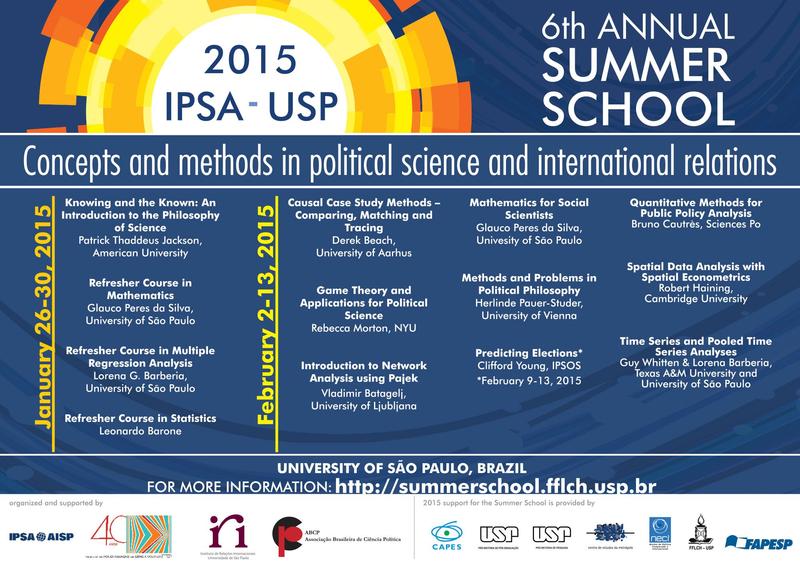

The 5th session of the IPSA-USP Summer School on Methods and Concepts in Political Science and International Relations was held at the University of São Paulo from January 27 to February 14, 2014. A cooperative partnership between the International Political Science Association (IPSA) and the University of São Paulo’s Department of Political Science and Institute of International Relations, the School welcomed 153 students from 62 institutions in 17 countries, with women accounting for 50% of the student body.
Courses were offered in a variety of quantitative and qualitative fields:
- Comparative Research Designs and Comparative Methods (Dirk Berg-Schlosser, Philipps University Marburg)
- The Philosophy and Methodology of the Social Sciences (Patrick Thaddeus Jackson, American University)
- Quantitative Methods for Public Policy Analysis (Bruno Cautrès, Sciences Po, Paris)
- Multi-level Analysis (Iñaki Sagarzazu, Glasgow University)
- Time Series and Pooled Time Series Analyses (Guy Whitten, Texas A&M University, and Lorena Barberia, University of São Paulo)
- Case Study Methodology – small-n research designs (Derek Beach, University of Aarhus, Denmark)
- Predicting Elections: Analytical Techniques and Illustrative Case Studies (Clifford Young, IPSOS-Washington)
- Introduction to Network Analysis using Pajek (Vladmir Batagelj, University of Ljubljana)
- Refresher Course Statistics (Lorena G. Barberia, University of São Paulo)
- Mathematics for Social Scientists (Glauco Peres da Silva, University of São Paulo)
Once again, students were invited to participate in four information sessions titled (respectively) “Preparing for a Career in Political Science”; “Graduate Studies in the U.S. and the U.K.”; “Early Career Challenges”; and “Publishing.”
The IPSA-USP Summer School also hosted a series of public lectures intended to enrich discussions on how methods are improving the quality of research in the field. The four late-afternoon lecture series given by Summer School faculty dealt with the following themes: Models, Methods and Techniques: Elections; Working with Census Data; Quantitative Strategies; and Small-n and Mixed Methods Strategies.
Institutional Partners
Generous support for the Summer School was provided by the Coordenação de Aperfeiçoamento de Pessoal de Nível Superior (CAPES), the University of São Paulo, FAPESP, IPSOS, IPSA, the Centro de Estudos da Metrópole (CEM), and the Brazilian Association of Political Science (ABCP).
Summer School Faculty
Local Organization Committee
Dirk Berg-Schlosser, Executive Director
Eduardo Marques, Department of Political Science, University of São Paulo
Lorena Barberia, Department of Political Science, University of São Paulo
Daniela Schettini, Institute for International Relations, University of São Paulo
Feliciano de Sá Guimarães, Institute for International Relations, University of São Paulo
Faculty Instructors
Lorena Barberia, University of São Paulo
Dirk Berg-Schlosser, Philipps University Marburg
Derek Beach, University of Aarhus
Vladmir Batagelj, University of Ljubljana
Bruno Cautrès, Sciences Po, Paris
Patrick Thaddeus Jackson, American University
Glauco Peres da Silva, University of São Paulo
Iñaki Sagarzazu, University of Glasgow
Guy Whitten, Texas A&M University
Clifford Young, IPSOS-Washington
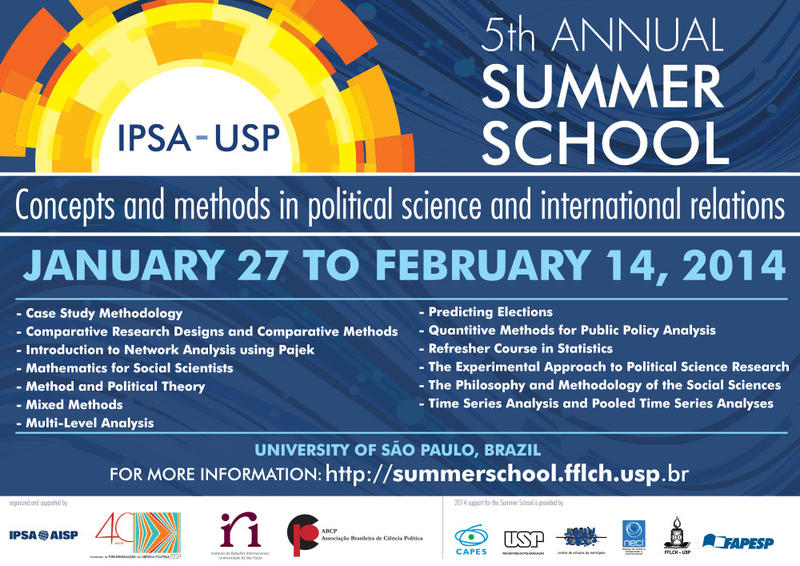
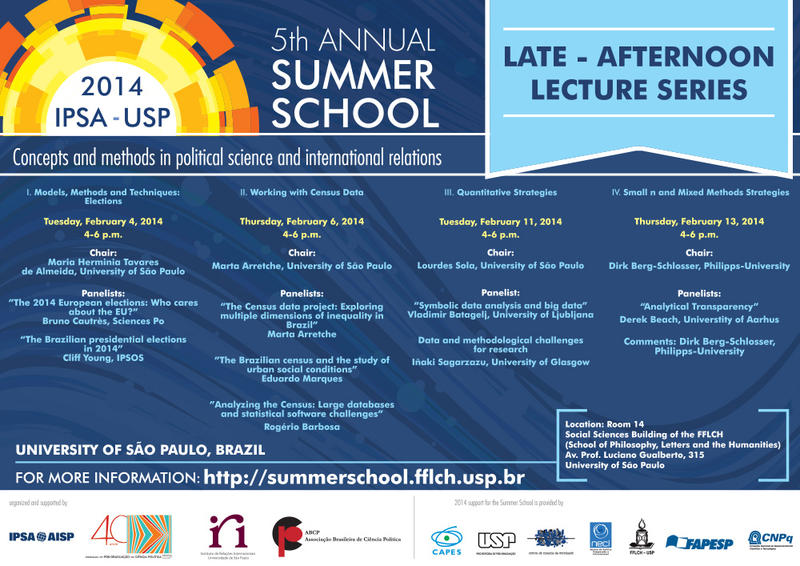
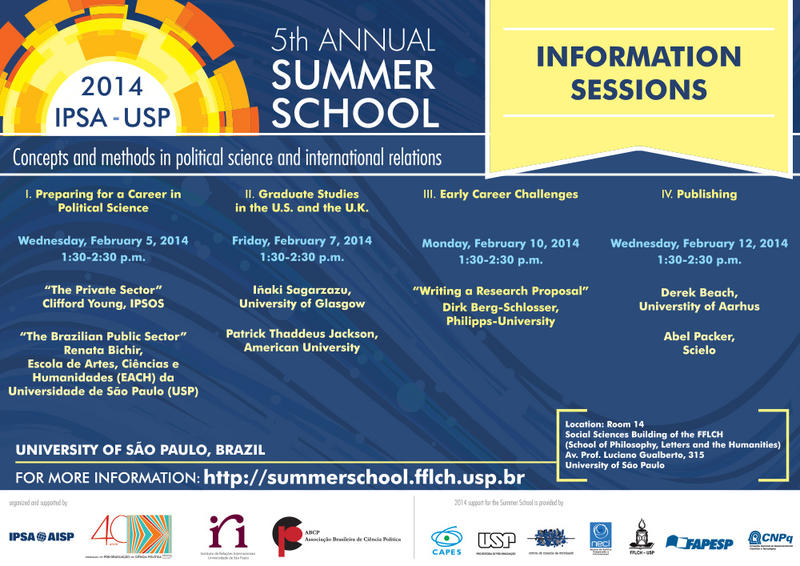

January 21, 2013 - February 8, 2013
University of São Paulo
São Paulo, Brazil
Building on the success of the first three editions of the IPSA Summer School, which was first presented at the University of São Paulo in 2010, the Fourth Annual IPSA Summer School was held from January 21 to February 8 at the University of São Paulo.
The Summer School is a cooperative partnership between the International Political Science Association (IPSA) and the University of São Paulo’s Department of Political Science and Institute of International Relations. For its fourth season, the Summer School welcomed a total of 126 students from 42 institutions in 14 countries, with women accounting for 40% of the student body.
Courses were offered in a variety of quantitative and qualitative fields:
- Comparative Research Designs and Comparative Methods (Professor Dirk Berg-Schlosser, Philipps University Marburg)
- Knowing and the Known: Philosophical Foundations of the Social Sciences (Prof. Patrick Jackson, American University)
- Quantitative Methods for Public Policy Analysis (Prof. Bruno Cautrès, Sciences Po, Paris)
- Game Theory and Applications for Political Science (Prof. Peter Rosendorff, New York University)
- Quantitative Textual Analysis (QTA) (Prof. Iñaki Sagarzazu, Nuffield College, University of Oxford)
- Time Series and Pooled Time Series Analyses (Prof. Guy Whitten, Texas A&M University)
- Case Study Methodology – Small-n Research Designs (Prof. Derek Beach, University of Aarhus, Denmark)
- Communications and Applied Research for Political and Policy Stakeholders (Prof. Clifford Young, IPSOS-Washington)
- Voting in Legislatures: From Theory to Data Analysis (Prof. Simon Jackman, Stanford University)
- Refresher Course in Mathematics and Statistics (Prof. Lorena G. Barberia and Glauco Peres da Silva, University of São Paulo)
Students were also invited to participate in four lunch-hour information sessions titled (respectively) “Writing Effectively About Scientific Research”; “Academic Careers in Political Science and International Relations in Brazil: Reflections on the Discipline”; “Graduate Studies Abroad”; and “Publication Strategies.” Four seminars were also promoted in conjunction with the Summer School: “The Epistemological Foundations of the Social Sciences”; “New Developments in Data Collection and Dissemination for Brazil”; “The Fundamentals of Doing Political Science Research: Recent Books in Methods for Political Sciences”; and “The Cases of the most Recent US and French elections”.
Institutional Partners:
The Summer School is a partnership between the International Political Science Association (IPSA), the Department of Political Science (DCP), the Institute for International Relations (IRI) at the University of São Paulo and the Brazilian Association of Political Science (ABCP).
Generous support for the 2010, 2011 and 2012 Summer Schools was provided by the IPSA, by the Coordenação de Aperfeiçoamento de Pessoal de Nível Superior (CAPES), by the University of São Paulo, by FAPESP and by the Centro de Estudos da Metrópole (CEM).
Summer School Faculty
Coordinating Faculty
Prof. Dirk Berg-Schlosser, Executive Director
Prof. Eduardo Marques, Local Organization Committe, Department of Political Science, University of São Paulo
Prof. Leandro Piquet Carneiro, Local Organization Committee, Institute for International Relations, University of São Paulo
Prof. Lorena Barberia, Local Organization Committe, Department of Political Science, University of São Paulo
Prof. Daniela Schetini, Local Organization Committee, Institute for International Relations, University of São Paulo
Faculty Instructors
Prof. Dirk Berg-Schlosser, Philipps University Marburg, Germany
Prof. Derek Beach, Universtity of Aarhus, Denmark
Prof. Bruno Cautrès, Sciences Po, Paris
Prof. Simon Jackman, Stanford University, USA
Prof. Patrick Jackson, American University
Prof. Peter Rosendorff, New York University
Prof. Iñaki Sagarzazu, Nuffield College, University of Oxford, UK
Prof. Guy Whitten, Texas A&M University, USA
Prof. Clifford Young, IPSOS-Washington
Profs. Lorena Barberia and Glauco Peres da Silva, University of São Paulo
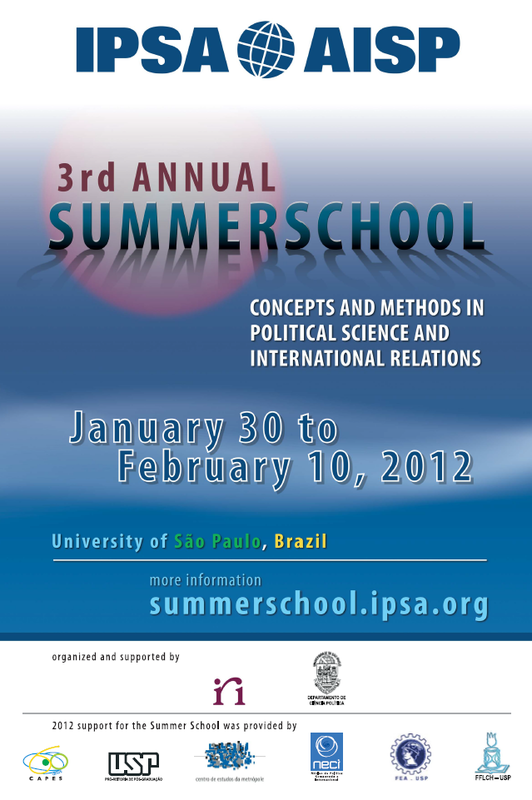 January 30, 2012 - February 10, 2012
January 30, 2012 - February 10, 2012
University of São Paulo
São Paulo, Brazil
Building on the First and Second IPSA Summer Schools held at the University of São Paulo in 2010 and 2011, the Third Annual IPSA Summer School set out to achieve three goals in 2012:
1. To train current and future scholars in cutting-edge social science methods, including qualitative and quantitative data analysis, as well as research design and research methods.
2. To bring together advanced social science scholars from the University of São Paulo, the rest of Brazil, other countries in Latin America, and the broader world in such a way as to create broad research networks that can stimulate the exchange of ideas, techniques and advanced methods across national and sub-disciplinary boundaries.
3. To further consolidate the effort to establish a Summer School in Latin America that can serve as a global center for the propagation of advanced methods and techniques in political science research.
Courses were offered in a variety of quantitative and qualitative fields:
1. Qualitative Comparative Analysis (QCA) and related methods (Professor Dirk Berg-Schlosser, Philipps University Marburg)
2. Mixed methods design (Prof. Max Bergman, University of Basel)
3. Analyzing cross-national data sets with multivariate techniques (Prof. Bruno Cautrès, Sciences Po, Paris)
4. Behavioral games and strategies in politics (Prof. Rebecca Morton, New York University)
5. Quantitative textual analysis (Prof. Iñaki Sagarzazu, Nuffield College, University of Oxford)
6. Multiple regression analysis (Prof. Guy Whitten, Texas A&M University)
7. Case study methodology – small-n research designs (Prof. Derek Beach, University of Aarhus, Denmark)
8. Communications and applied research for political and policy stakeholders (Prof. Clifford Young, IPSOS-Washington)
9. A Practical Introduction to Bayesian Statistical Modeling (Prof. Simon Jackman, Stanford University)
For the first time, Professors Lorena G. Barberia, Glauco Peres da Silva and Fernando Guarnieri from the University of São Paulo taught a one-week refresher course in mathematics and statistics in the week preceding the Summer School. The course provided basic training in mathematical concepts and statistics to prepare students for the courses offered in the IPSA Summer School 2012.
Students met each day for classes in their specific courses, with many instructors lecturing in the morning hours and then conducting computer labs, group exercises, or study sessions in the afternoons.
Students were also invited to participate in four informational sessions during lunch times, on the subjects of “Careers Outside of Academia”; “Visiting Scholar and Post Doc Positions Abroad”; “Graduate Studies Abroad”; and, “Publication Strategies.” These proved to be quite popular among the students, and led to spirited question and answer periods.
Parallel with, and complimentary to the Summer School, the International Seminar program in the late afternoons served as a useful form of outreach, by which instructors and Brazilian faculty working on related questions presented their research findings to the broader university community. It also served as a useful means of introducing students to other instructors’ research and methods. In 2012, two seminars were devoted to examining “Voting and elections”, one seminar was focused on examining “The state of the discipline” and one seminar on “Globalization and the economic crisis”. The International Seminar program was very popular, bringing together both Summer School students and the local academic community in numbers that frequently surpassed 100 people. Full video of the information and seminar sessions were recorded and became available at the School website.
The School admitted 138 students, 41% of them female. The median age was 30; the average age was 32. Students came from 44 different institutions in 15 different countries: Brazil, Argentina, Germany, Chile , Colombia, Czech Republic, Spain, Italy, Portugal, Ukraine, Montenegro, Russian, Slovak Republic, USA, Belgium and Venezuela.
The School was coordinated by Prof. Dirk Berg-Schlosser (Executive Director); Prof. Eduardo Marques; Prof. Leandro Piquet Carneiro; Prof. Lorena Barberia and Prof. Daniela Schetini (Local Organization Committee)
Special Activities
Additionaly to the courses, the Summer School offered special activities. It also included four informational sessions during lunch times, on the subjects of “Careers Outside of Academia”; “Visiting Scholar and Post Doc Positions Abroad”; “Graduate Studies Abroad”; and, “Publication Strategies".
Parallel with, and complimentary to the Summer School, the International Seminar program in the late afternoons served as a useful form of outreach, by which instructors and Brazilian faculty working on related questions presented their research findings to the broader university community. It also served as a useful means of introducing students to other instructors’ research and methods. In 2012, two seminars were devoted to examining “Voting and elections”, one seminar was focused on examining “The state of the discipline” and one seminar on “Globalization and the economic crisis”.
You may watch these activities using the following links:
The Summer School was developed as partnership between the International Political Science Association (IPSA), the Department of Political Science (DCP), the Institute for International Relations (IRI) at the University of São Paulo and the Brazilian Association of Political Science (ABCP), which joined the effort in 2012 for the first time.
Generous support for the Summer School was provided by the IPSA, by the Coordenação de Aperfeiçoamento de Pessoal de Nível Superior (CAPES), by Fundação de Amparo à Pesquisa do Estado de São Paulo (FAPESP), the University of São Paulo (Dean of Graduate Studies - Pró-Reitor de Pós-Graduação and Dean of Research - Pró-Reitor de Pesquisa), and by the Centro de Estudos da Metrópole (CEM).
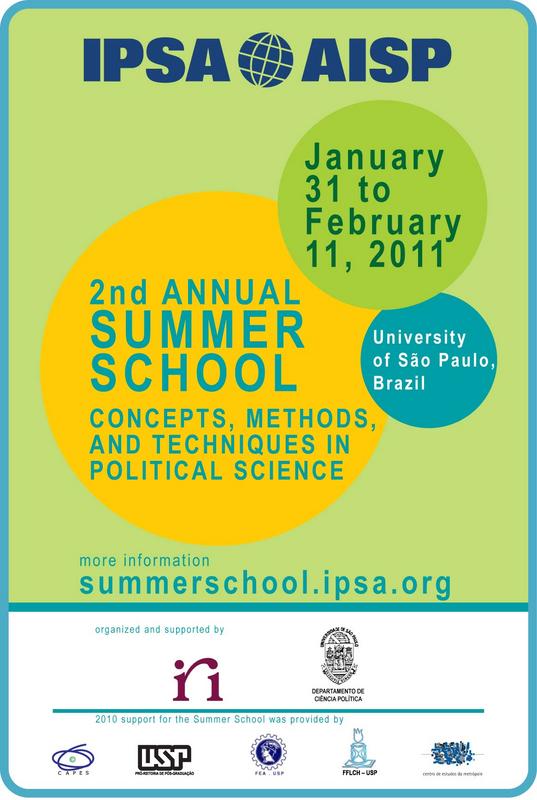 January 31, 2011 - February 11, 2011
January 31, 2011 - February 11, 2011
University of São Paulo
São Paulo, Brazil
The Second Annual IPSA Summer School set out to achieve three goals in 2011:
1- To train current and future scholars in cutting-edge social science methods, including qualitative and quantitative data analysis, as well as research design and research methods.
2- To bring together advanced social science scholars from the University of São Paulo, the rest of Brazil, other countries in Latin America, and the broader world in such a way as to create broad research networks that can stimulate the exchange of ideas, techniques and advanced methods across national and sub-disciplinary boundaries.
3- To consolidate the effort to establish a Summer School in Latin America that can serve as a global center for the propagation of advanced methods and techniques in political science research.
Courses were offered in a variety of quantitative and qualitative fields:
1- Comparative research design and configurational comparative methods (Professor Dirk Berg-Schlosser, Philipps University Marburg)
2- Mixed methods design (Prof. Max Bergman, University of Basel)
3- Comparative survey design (Prof. Bruno Cautrès, Sciences Po, Paris)
4- The experimental approach to political science research (Prof. Rebecca Morton, New York University)
5- Textual analysis (Prof. Rainer Schmidt, Martius Chair of European and German Studies, University of São Paulo; and Prof. Matthias Hastall, University of Augsburg)
6- Multiple regression analysis (Prof. Guy Whitten, Texas A&M University)
7- Qualitative methods and research designs (Prof. Gary Goertz, University of Arizona)
8- Communications and applied research for political and policy stakeholders (Prof. Clifford Young, IPSOS-Washington)
The School admitted 164 students, 41% of them female. The median age was 30; the average age was 32. Students came from 35 different institutions in 16 different countries: Brazil, Argentina, Mexico, Germany, Chile, Colombia, Czech Republic, France Italy, Poland, UK, India, Norway, Spain, USA and Venezuela.
The educational background of students was very heterogeneous, but also very high-level. Faculty and post-doctoral fellows accounted for a fifth of the student body, and Ph.D. students accounted for half.
Students met each day for classes in their specific courses, with many instructors lecturing in the morning hours and then conducting computer labs, group exercises, or study sessions in the afternoons. Students were also invited to participate in three informational sessions during lunch times, on subjects such as “Pursuing graduate study abroad”; “Surviving graduate school”; and “Publishing in political science.”
Parallel with, and complimentary to the Summer School, the International Seminar program in the late afternoons served as a useful form of outreach, by which instructors’ work was presented to the broader university community. It also served as a useful means of introducing students to other instructors’ research and methods. In 2011, the Seminars addressed the following themes: “Is political behavior biological?”; “Variable polls across variable places: the validity of survey research across boundaries”; "The quest for causal inference - recent developments in the social sciences"; and “Descriptive-causal generalizations: 'empirical laws' in the social sciences?".
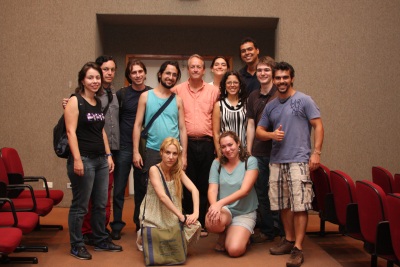
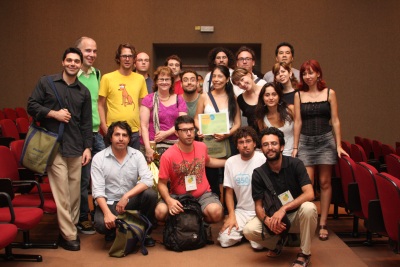

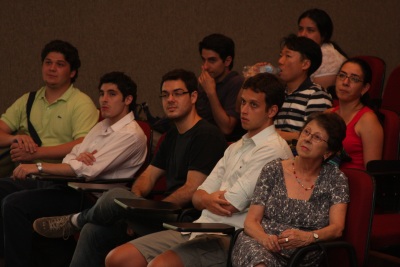
Institutional Partners:
The Summer School is a partnership between the International Political Science Association (IPSA), the Department of Political Science (DCP) and the Institute for International Relations (IRI) at the University of São Paulo.
Generous support for the Summer School was provided by the IPSA, by the Coordenação de Aperfeiçoamento de Pessoal de Nível Superior (CAPES), by the University of São Paulo, and by the Centro de Estudos da Metrópole (CEM/CEBRAP).
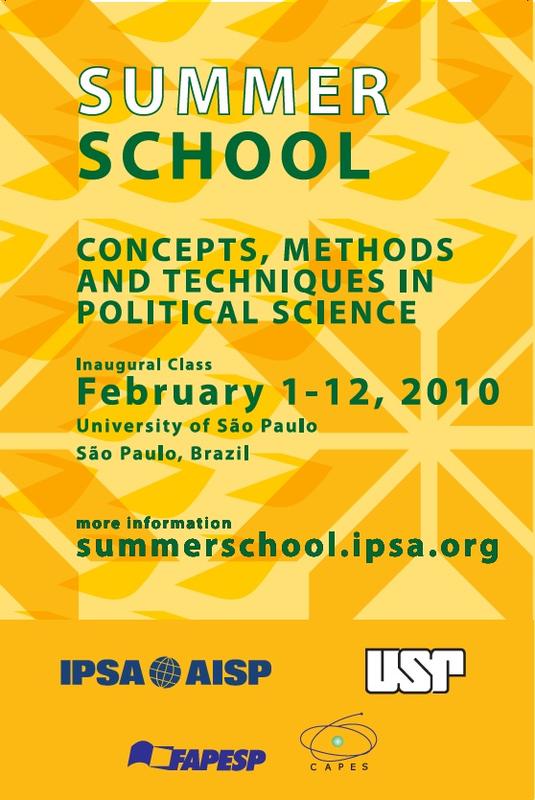 February 1-12, 2010
February 1-12, 2010
University of São Paulo
São Paulo, Brazil
The first IPSA São Paulo Summer School happened between February 1 and February 12, 2010. The School brought together nearly 90 students from around the world for six different courses in methodology. The 2010 IPSA Summer School’s first goal was to provide young scholars of social science in Brazil and other South American countries with access to high-quality, cutting-edge, advanced training in qualitative and quantitative social science methods. We have no doubt that this goal was fully accomplished. Despite the rush to get the Summer School up and running in less than four months, this inaugural Summer School gathered together top-notch students and excellent instructors for a truly dynamic two weeks together.
The Summer School established by a cooperative partnership between the International Political Science Association (IPSA) and the Department of Political Science and the Institute of International Relations at the University of São Paulo.
The Summer School received 87 students coming from 35 different institutions in 10 different countries. Around 40% of the students were enrolled in a PhD program, 28% in a master program and 19% were already faculty. The gender breakdown of enrolled students was one-third female (29); two-thirds male (58). The age was 32.
Classes were the primary activity during the Summer School, with class lectures every morning, followed by lab sessions, group activities, and study sessions in the afternoons.
During six of our ten nights together, students were also invited to participate in an Evening Lecture Series that was open to the public. At the Evening Lectures, each of the six instructors talked about their research, and a prominent local academic led discussions about the substantive and methodological implications. The Evening Lecture Series was very popular, bringing together both Summer School students and the local academic community in numbers that frequently surpassed 100 people.
There were few organized social events for all participants in the Summer School. However, we did hold an opening cocktail party on the first Monday of the Summer School, which proved to be an effective way to kick off the networking that the Summer School aims to encourage. Students also organized their own outings with each other, as well as with instructors. Instructors had a number of gatherings as a group, to discuss the Summer School as well as to show them the sights of São Paulo.
The Summer School was coordinated by:
Prof. Dirk Berg-Schlosser, Executive Director
Prof. Mathew Taylor, Local Organization Committee, Department of Political Science, University of São Paulo
Prof. Leandro Piquet Carneiro, Local Organization Committee, Institute for International Relations, University of São Paulo
The School offered the following courses:
- Game Theory
(Prof. Rebecca Norton, New York University) - Comparative research design and configurational comparative methods (Prof. Dirk Berg-Schlosser, Philipps University Marburg)
- Comparative survey design
(Prof. Bruno Cautrès, Sciencespo, Paris) - Multiple regression analysis
(Prof. Guy Whitten, Texas A&M University) - Methodologies of case studies
(Delia Schindler, Hamburg University) - Mixed methods design
(Prof. Max Bergmann, University of Basel)
Generous support for the Summer School was provided by the IPSA, by the Coordenação de Aperfeiçoamento de Pessoal de Nível Superior (CAPES), by the University of São Paulo, and by the Centro de Estudos da Metrópole (CEM/CEBRAP).
